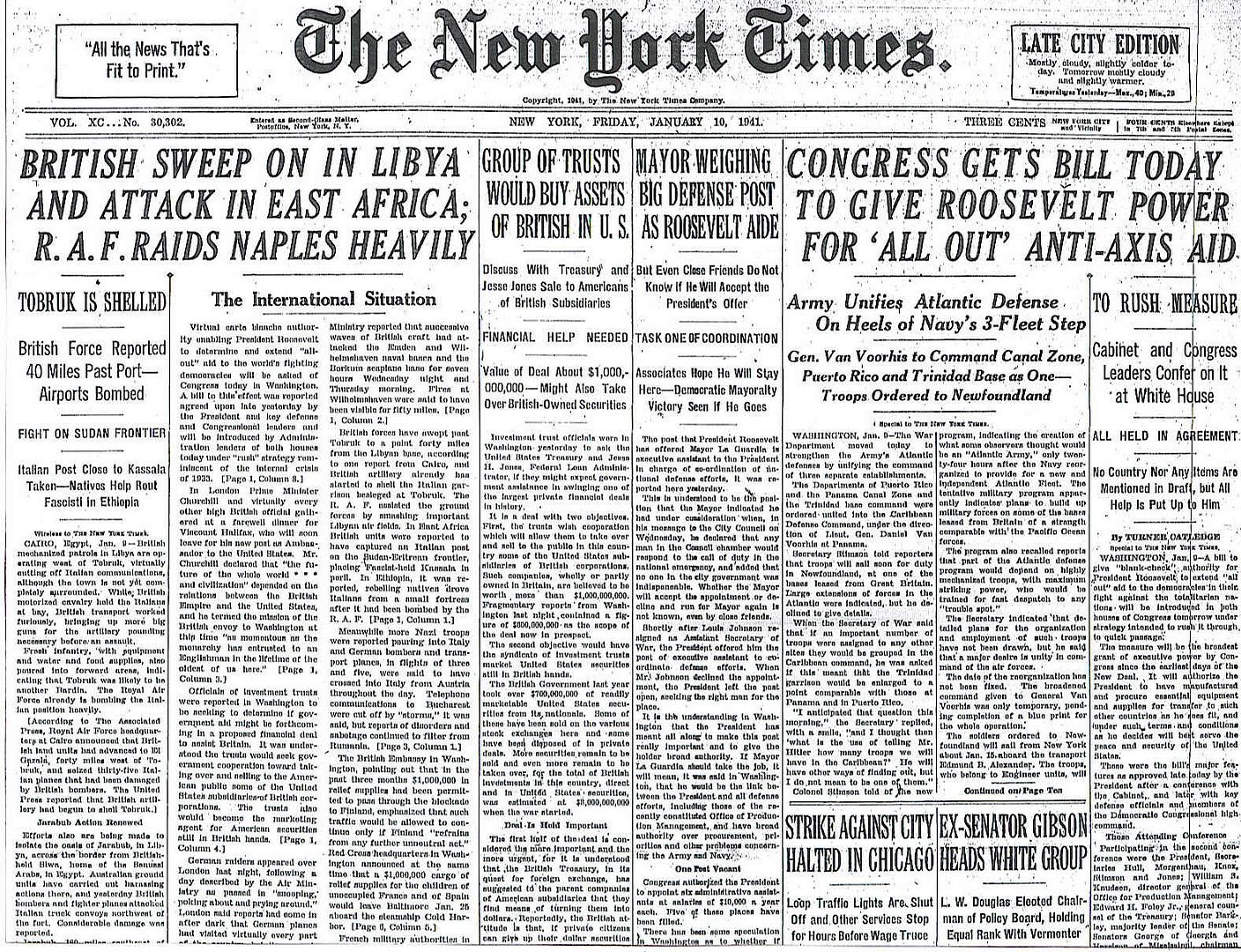
Posted on 01/10/2011 4:58:00 AM PST by Homer_J_Simpson

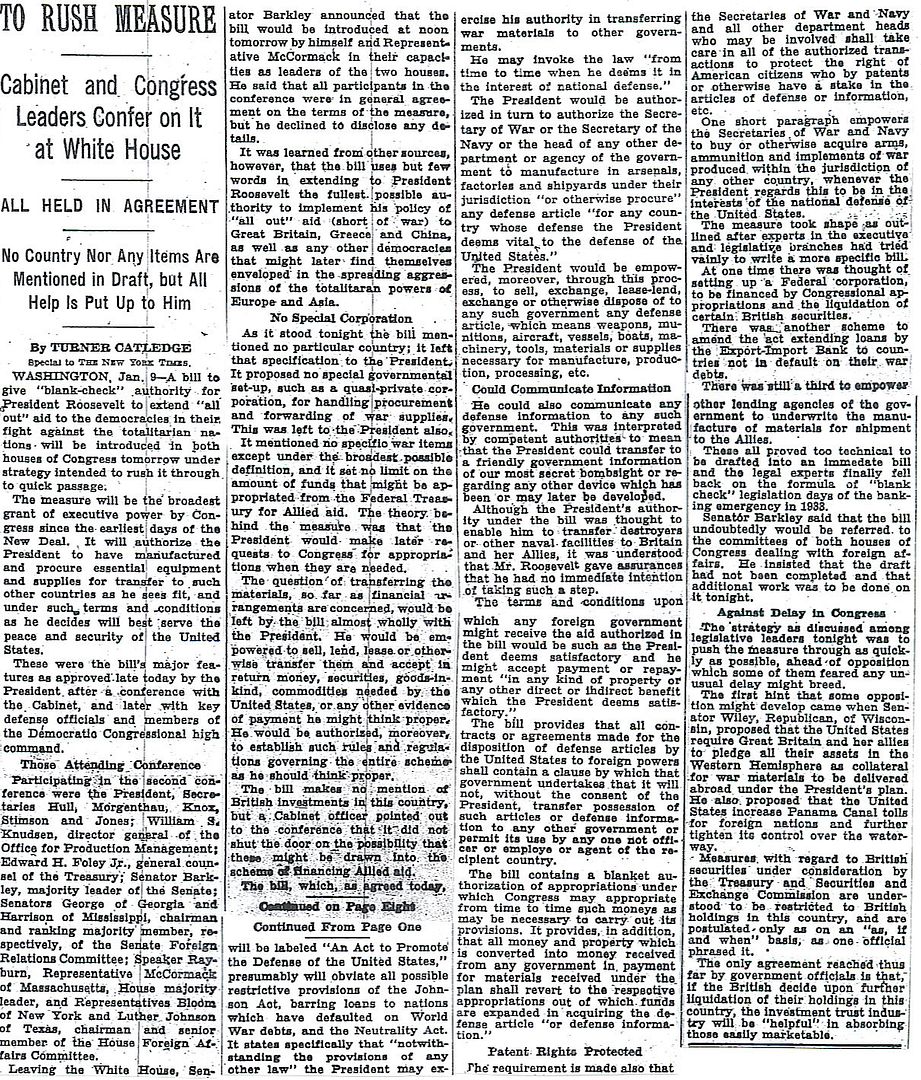
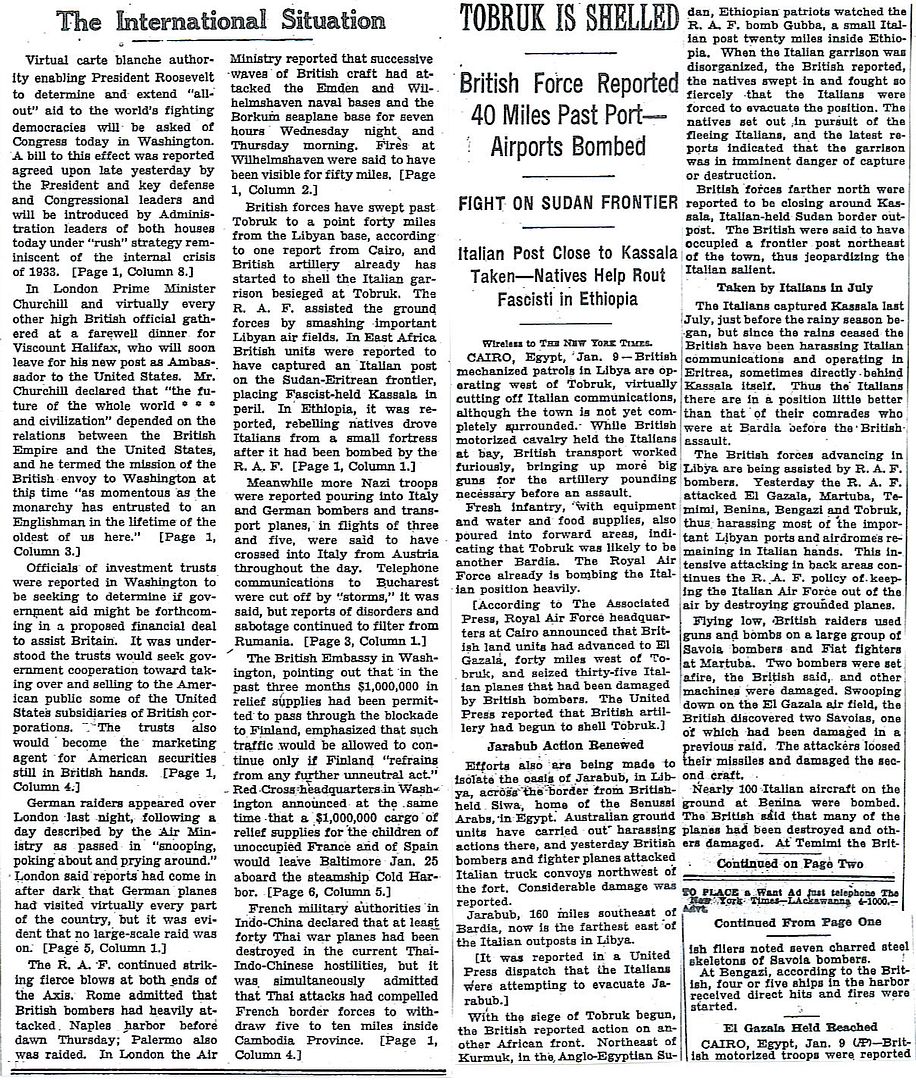
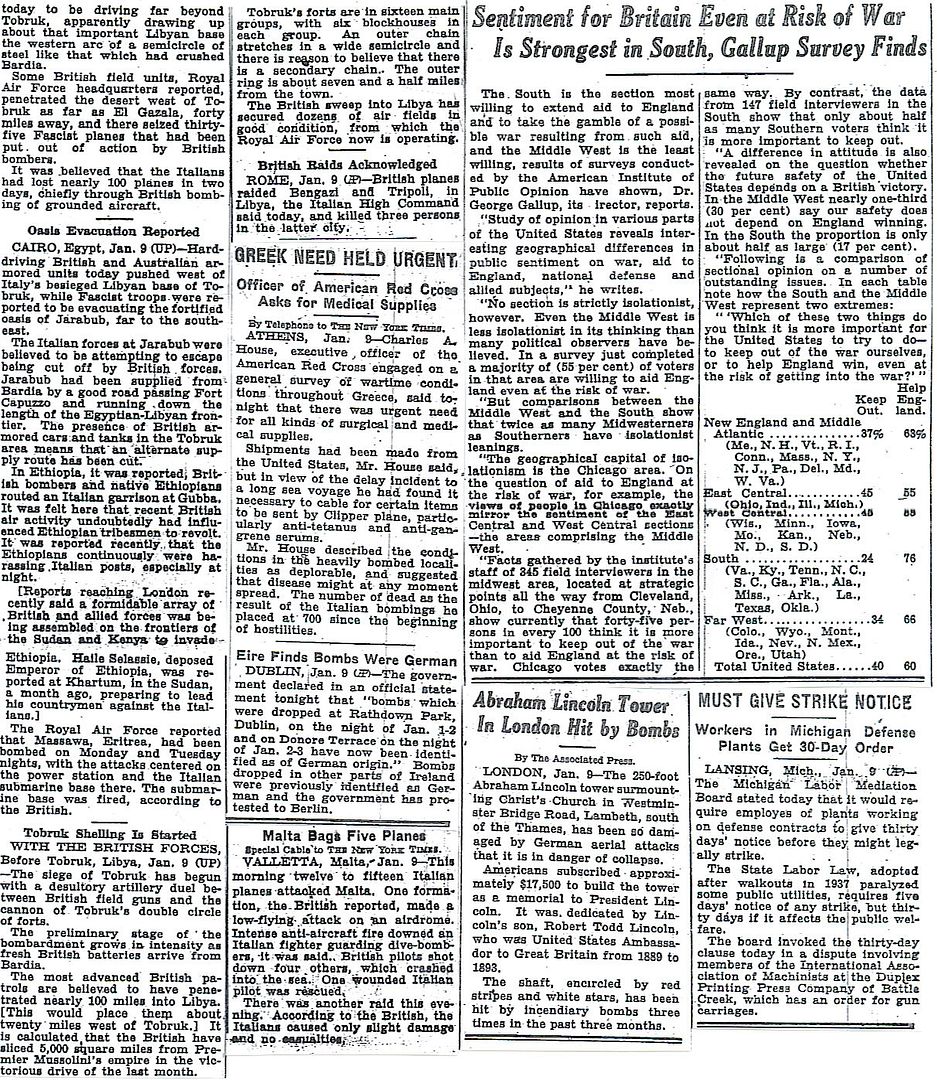
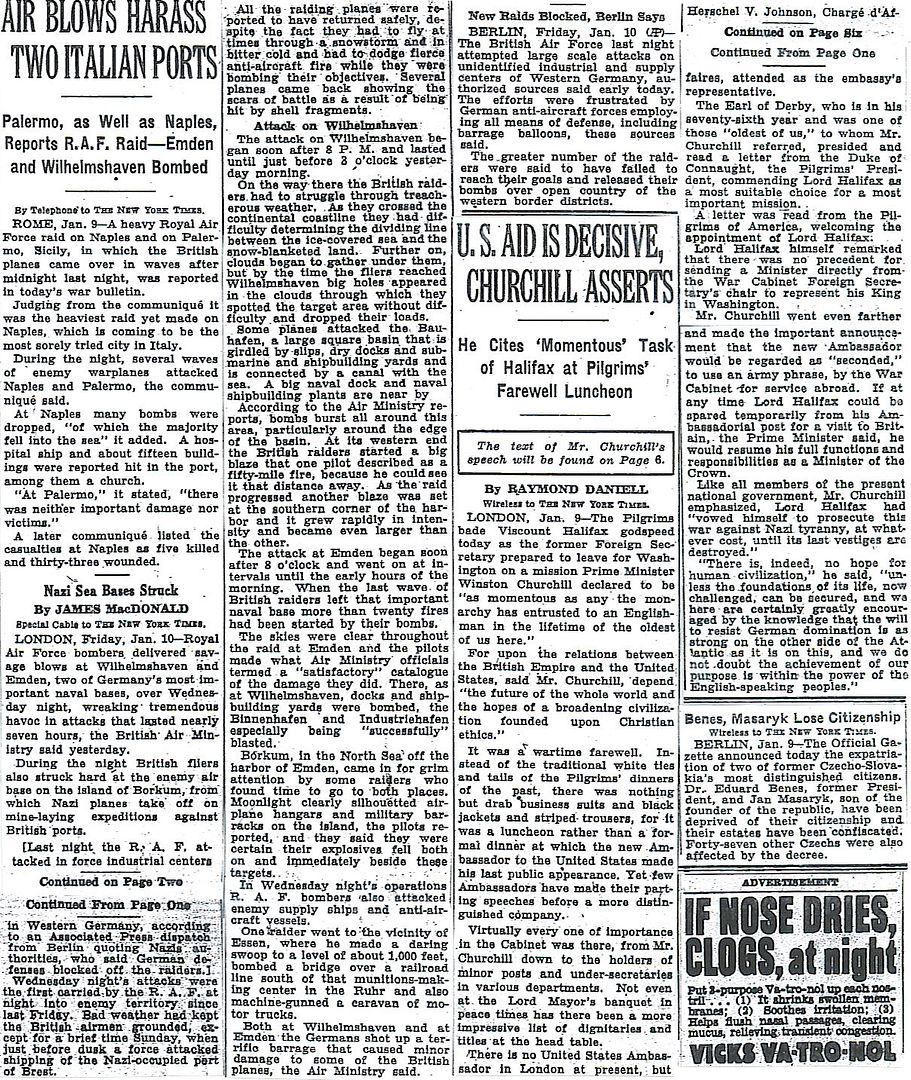
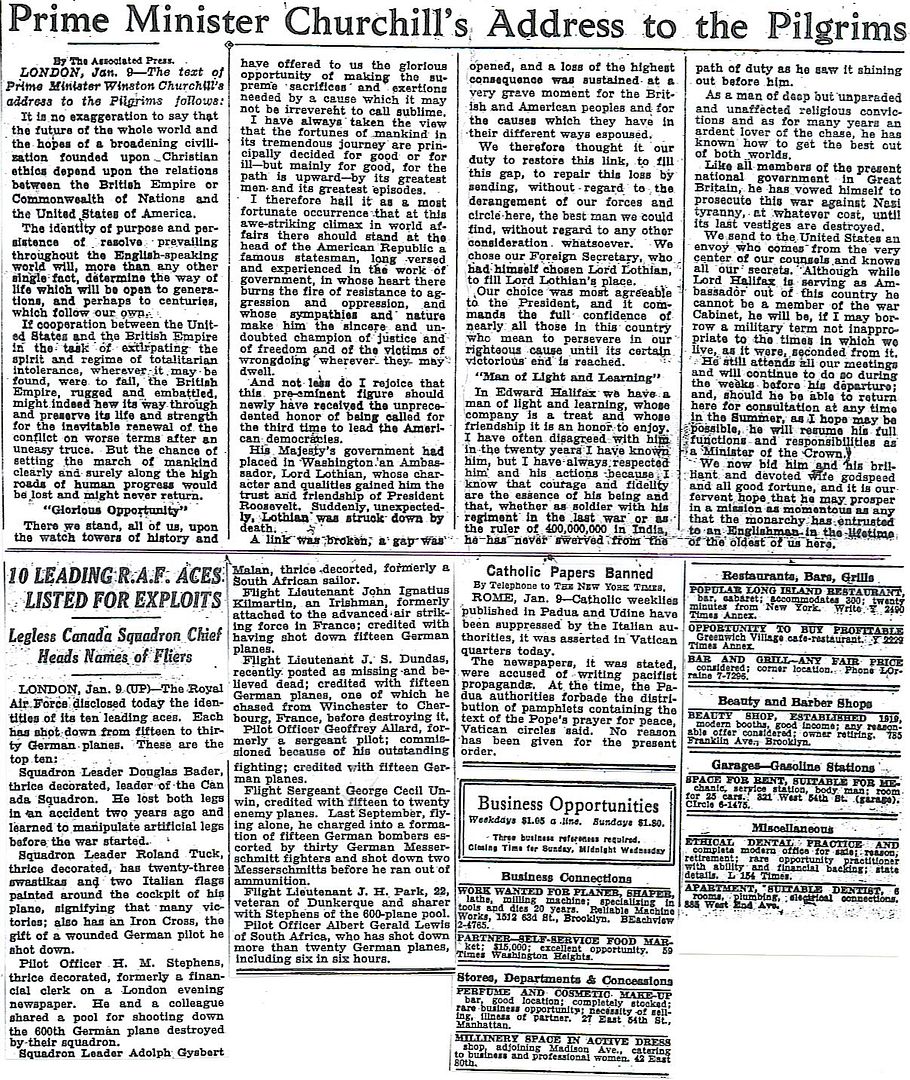
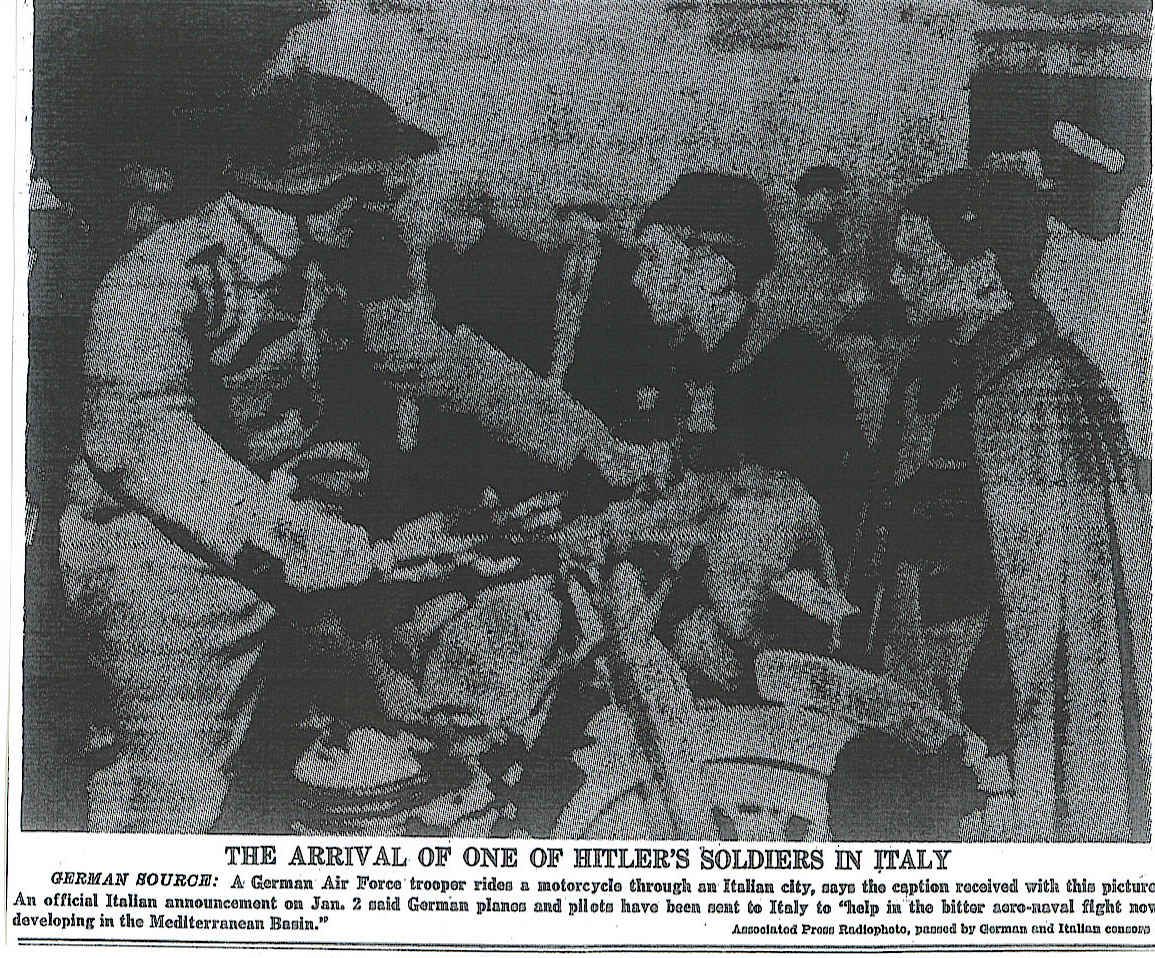
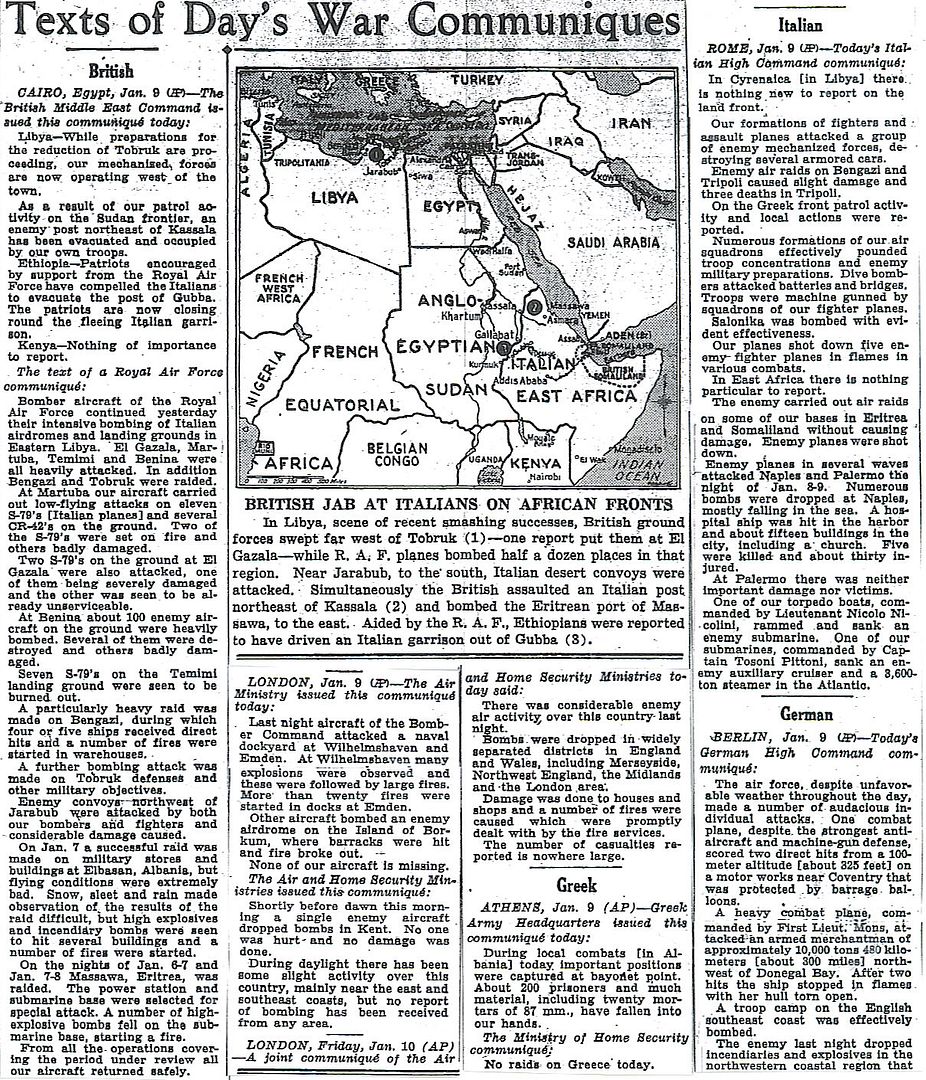

To Rush Measure – 2
The International Situation – 3
Tobruk is Shelled – 3-4
Sentiment for Britain Even at Risk of War is Strongest in South, Gallup Survey Finds – 4
Abraham Lincoln Tower in London Hit by Bombs – 4
Air Blows Harass Two Italian Ports – 5
U.S. Aid is Decisive, Churchill Asserts – 5
Prime Minister Churchill’s Address to the Pilgrims – 6
10 Leading R.A.F. Aces Listed for Exploits – 6
The Arrival of One of Hitler’s Soldier’s in Italy (photo) – 7
Texts of Day’s War Communiques – 8-9
http://www.onwar.com/chrono/1941/jan41/f10jan41.htm
British convoy attacked in Mediterranean
Friday, January 10, 1941 www.onwar.com
In the Mediterranean... Off Pantelleria a British convoy is attacked, first by two Italian torpedo boats, one of which is sunk for no loss to the convoy, and then by 40 German Stuka and Ju88 bombers. The carrier Illustrious is hit six times by dive bombers. Warspite dodges several attacks but other ships are also damaged. This is the first action by the German 10th Air Corps. Illustrious retires to Malta. All the British forces from Gibraltar and Alexandria have been out covering convoys for Greece and Malta. More troops and 18 fighters are brought to Malta. The British destroyer Gallant is sunk after striking an Italian mine in the Sicilian Channel
In Washington... The Lend-Lease Bill is introduced to Congress. There is considerable opposition. Among the prominent opponents of the bill are Senators Wheeler and Nye, former Ambassador Kennedy and Charles Lindbergh.
In Moscow and Berlin... Soviet-German pacts on frontiers in Eastern Europe and on trade are signed. Food and raw materials are to be exchanged for industrial equipment. The economic benefits to Germany of the agreement with the Soviet Union will continue until the very day that Operation Barbarossa begins.
In Albania... The Greek forces take Klisura after the four Italian divisions in the area are pulled back.
http://homepage.ntlworld.com/andrew.etherington/month/thismonth/10.htm
January 10th, 1941
UNITED KINGDOM:
Portsmouth: Intense night air attacks are made on the town, churches, hospitals and private dwellings are hit and many are rendered homeless.
London: Churchill insists that assistance to Greece must be top priority after the capture of Tobruk. But Wavell denies this, saying that the German build-up is a “...move in a war of nerves designed with object of helping Italy by upsetting Greek nerves, inducing us to disperse our forces in Middle East and to stop our advance in Libya. Nothing (repeat nothing) we can do from here is likely to be in time to stop German advance if really intended...”
Fleetwood, Lancashire: Lord Derby, speaking to Rossall School, told the boys that after the war there would be a commercial battle for the markets of the world, and he urged: “Fit yourselves for that battle, because it will be battle, make no mistake about it.”
GERMANY: U-560 is launched. (Dave Shirlaw)
U.S.S.R.: Moscow: Germany and Russia signed a new, enlarged, economic agreement in Moscow today. The agreement is of special value to the Nazi war machine, for the Russians are sending the Germans industrial raw materials, oil products and foodstuffs, particularly grain.
It is believed that among the raw materials are rubber, manganese and chromium. Vital in the production of weapons, these materials are in short supply in Germany because of the British blockade. The Germans will also get petroleum products and trainloads of wheat from the Ukraine, the “bread-basket of Europe”.
In return the Russians will receive German machine tools to re-equip the Soviet Union’s out-of-date factories. According to the official Soviet communiqué: “This new economic agreement marks a great step forward.”
MEDITERRANEAN SEA: Operation ‘Excess’ has reached the Strait of Sicily and is attacked by Italian torpedo boats. ‘Vega’ is sunk by escorting cruiser HMS Bonaventure and destroyer HMS Hereward. As the Mediterranean Fleet meets the convoy off Pantalleria one of the screening destroyers HMS Gallant, is mined in the 120 miles west of Malta at 36 27N 12 11E. As her bows are blown off right back to the bridge, she is towed back to Malta stern first, however, after survey, she is declared a total loss. There are 60 casualties, but 85 of the crew survive. Towed back to Malta, she is not re-commissioned and is finally wrecked by bombing in April 1942. (Alex Gordon)(108)
Still to the west of Malta, heavy attacks by German and Italian aircraft are launched. HMS Illustrious is singled out and soon hit six times by thirty JU87 and Ju88 bombers of the Luftwaffe’s elite X Fliegerkorps, a unit specially trained to dive-bomb surface ships. It began with a feint attack by two Italian torpedo bombers which drew off Illustrious’s fighters, leaving her without air protection. She struggles into Malta with 200 casualties, her steering gear smashed
ALBANIA: Greek forces take Klisura after the four Italian divisions in the area are pulled back. (Jack McKillop)
NETHERLANDS: All Jews are ordered to register with the authorities.
FRENCH INDOCHINA: The Thai army renews their ground offensive against the French. (Michael Alexander)
CANADA: Minesweepers HMCS Vegreville, Medicine Hat, Red Deer and Drummondville laid down. (Dave Shirlaw)
U.S.A.: Washington: The administrations leading supporters in Congress asked their colleagues today to give President Roosevelt what amounts to a blank cheque to arm Britain. The bill authorising massive deliveries of arms to Britain is popularly known as the “Lease-and-Lend” Bill. It empowers the President to send weapons, munitions, aircraft, ships, machinery and blueprints to any country whose defence he deems vital to that of the United States. Estimates of the eventual cost of this bill have reached $2.5 billion. The bill also gives the President sweeping powers to:
1. Test, inspect, fit out or otherwise place in good working order any defence article for any government whose defence it deems vital;
2. Sell, transfer, exchange, lease, lend, or otherwise dispose of any defence article;
3. Communicate to any government any defence information.
At the same time the President took special powers to prevent six essential raw materials from reaching the Axis powers - copper, brass, bronze, zinc, nickel and potash. It is US policy to help the democracies to survive, he told a press conference, speedy methods must be used which were strictly legal.
Washington: Before the House committee on naval affairs, Rear Admiral Towers stated that, in the past year, only 445 planes were obtained by the navy. He attributed the small output to “indecision and vagueness” on the part of the administration. Admiral Towers said that the Navy’s goal is 16,000 fighting planes. At present there are 2,590 in use, and, of these, very few are modern.
The Vought SB2U-3 Vindicator makes its first flight.
Hart visited by Commander John L McCrea, a special courier from the Navy Department, who advises Hart that Rainbow-3 (WPL 44) which called for the Asiatic Fleet to be reinforced with at least a cruiser division of four ships, a single aircraft carrier, YORKTOWN, and a destroyer squadron. (Marc Small)
http://worldwar2daybyday.blogspot.com/
Day 498 January 10, 1941
Albania. Greek infantry captures the Klisura Pass after 4 days of fighting, led by the 5th Division just arrived from Crete. The presence here of Cretan 5th Division will cause controversy in a few months when Allied troops fail to protect Crete.
Italian torpedo boats Vega and Circe attack Excess convoy at dawn in the Strait of Sicily but Vega is sunk by shellfire from cruiser HMS Bonaventure and a torpedo from destroyer HMS Hereward. At 8.15 AM, the convoy meets Admiral Cunningham’s Mediterranean Fleet (battleships HMS Warspite and HMS Valiant, aircraft carrier HMS Illustrious and 7 destroyers) from Alexandria but destroyer HMS Gallant hits a mine and will be towed to Malta (58 killed, 25 wounded). At 12.35 PM, German Ju87 Stuka dive bombers from X Fliegerkorps (which has just arrived on Sicily) attack HMS Illustrious, hitting her with 6 bombs. Most do not penetrate the thick deck armour but 2 bombs go down an aircraft elevator shaft, turning the hangar deck into an inferno of burning aviation fuel and destroying the steering gear (124 killed). Only the armoured flight deck saves Illustrious from total destruction and she struggles into Malta escorted by destroyers HMS Hasty and Jaguar.
Overnight, 300 Luftwaffe bombers attack Portsmouth, England, with high explosive and incendiary bombs (171 civilians killed, 430 injured). Incendiary bombs land in the roof of the Guildhall which burns green as the copper cupola melts. Guildhall is gutted and will not reopen until 1959.
If I recall correctly, the Russians also received the blueprints for the BISMARCK class battleship, and were promised , butmay not have received a German warship [cruiser?].
Worth noting again: today the South and Midwest are pretty solid "red state" regions.
But in 1940, the South was Roosevelt's most solid support, and the Midwest was the last Republican stronghold.
In foreign policy, the South had Britain's strongest supporters, while the Midwest, with many Americans of German descent, most strongly wanted to stay out of the fight.
In this first meeting with Hopkins, Churchill also weighted in on what he felt the status of Greece really was, especially with the possibility of Germany coming in to aid the Italians.
Hopkins later said Churchill told him on the tenth that, “He thinks Greece is lost - although he is now reinforcing the Greeks and weakening his African army”.
I find it interesting that he would make this comment considering that the battle for Greece as well as Wavell’s offensive in Africa have been the only signs of allied victory on the ground this entire war. Things from this perspective look pretty good at the moment.
"The reasons which persuaded me to recommend to the Führer that the name "Deutschland" should be changed to "Lützow" are the following:
1. The return of the Panzerschiff Deutschland to home waters and the evacuation of the North Atlantic area of operations by German surface units must be concealed from the enemy for as long as possible in order that enemy forces tied down there by her assumed presence should remain and so effectively free Graf Spee for her activities in the South Atlantic and Indian Oceans. The change of name is favoured in view of the secrecy of this purpose.
2. It is intended to sell the heavy cruiser Lützow to the USSR. It is desirable that this fact is concealed for as long as possible. The change of name is helpful for camouflaging the purpose.
3. The need continually to deploy the Panzerschiffe compels us to accept the possibility that eventually one of them may fall victim to a superior enemy force. On the one hand, it would be a highly undesirable psychological blow to the Kriegsmarine and the whole German people; and on the other hand it would be a welcome opportunity for the enemy to make political capital of the fact that an Panzerschiff with the name "Deutschland" had been sunk by them. It is proper to change the name and so avoid the general psychological effect that such a loss would entail.
More on this particular ship can be found here.
You are correct. The plans for Bismark were delivered to Stalin.
On the 31st of May 1940 the hull of the cruiser Lützow (Hipper class), with only two turrets (only one of which was complete and had guns installed) was towed to the Baltic Shipyard at Leningrad by tugs. The completion of construction was designated to Soviet workers, technicians and engineers under the supervision of German technicians and engineers.
Of some interest the name Lützow was then used to rename the German pocket battleship Deutschland after the December 1939 loss of her sistership Admiral Graf Spee in December 1939
Don’t get your Lützows confused.
The Lützow which was originally the Panzerschiff Deutschland was laid down in 1929 and launched in 1931. Renamed the Lützow in January 1940. (Seized and later sunk by the Reds after the war ended).
The other Lützow (a heavy cruiser) was laid down in 1937 and launched in 1939. It was the one that was slated for the Soviets, as I recall.
It was never commissioned by the Germans, and was apparently never finished by either country. I’ve seen a note that it was towed to Leningrad in the spring of 1940 and renamed the Petropavlovsk . I don’t know if it ever got its engines and guns. (One site indicates that the engines were installed. http://www.german-navy.de/kriegsmarine/ships/heavycruiser/lutzow/operations.html ) (On the other hand, Wikipedia says that the engines were inoperable, but that one turret was completed with guns installed) Broken up 1950.
In any event, it appears one Lützow was delivered to the Bolsheviks.
On Sunday June 22nd at 2 AM a long Soviet freight train crossed the bridge over the Bug river{the demarcation line separating Germany from the Soviet Union} heading for Germany with Stalin's last contribution to the German economy. The Russian train men noticed nothing unusual as they passed through the Polish forest even though the woods on both sides of the railway were crammed with hundreds of thousands of German infantry, Panzers and artillery which were preparing to invade the Soviet Union at dawn.
Disclaimer: Opinions posted on Free Republic are those of the individual posters and do not necessarily represent the opinion of Free Republic or its management. All materials posted herein are protected by copyright law and the exemption for fair use of copyrighted works.